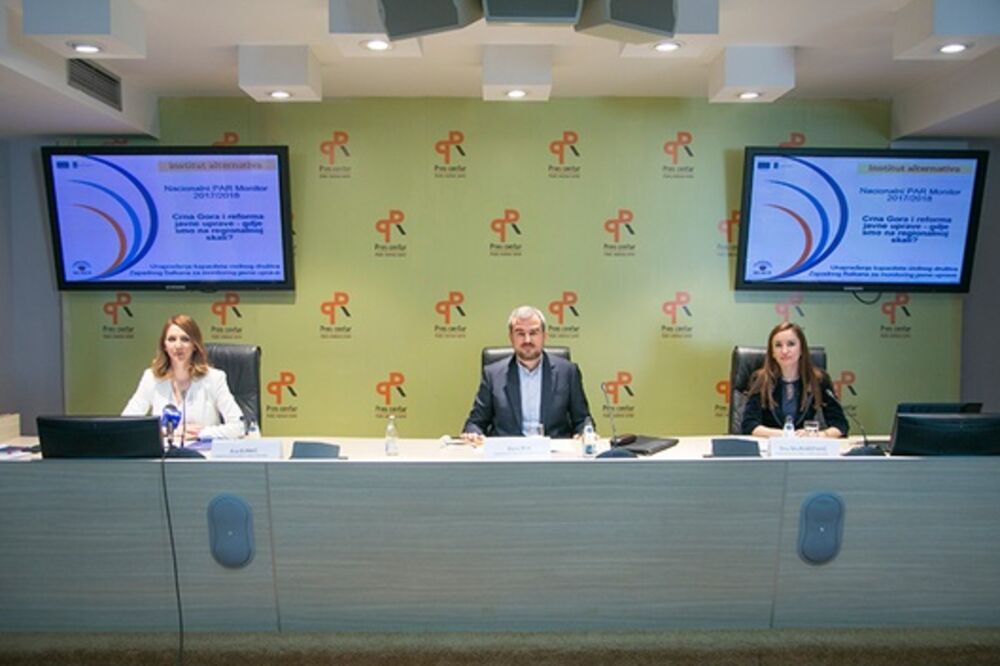According to the overall assessments of progress in the reform of public administration, Montenegro is far from the leader in the region, and it records a better result only in relation to Bosnia and Herzegovina, announced the president of the Board of Directors of the Institute of Alternatives (IA), Stevo Muk.
At the press conference "Montenegro and public administration reform - where are we on a regional scale?", organized by IA, he said that the results of research conducted in six countries of the Western Balkans indicate that those countries face numerous shortcomings in meeting European standards. union for joining the field of reform and public administration.
"Based on the results of our research, the findings show that the countries of the region, on average, achieved the most in the area of service provision, followed by the area of public finance management. The category of development and coordination of public policies appears as the most critical area of public administration reform in the Western Balkans region," said Muk.
He said that, according to the overall assessment of progress in the reform of public administration, Montenegro is far from the leader in the region, and that it records a better result only in relation to Bosnia and Herzegovina.
"Compared to the countries of the region, Montenegro achieved the best results in the area of the strategic framework for the reform of public administration, and the worst in the area of public finance management," announced Muk.
According to him, Montenegro achieved the best result in the area of the strategic framework for public administration reform due to the implementation of the consultation process in the preparation of the public administration reform strategy, as well as because, as he stated, it included civil society.
"In addition, the Council for Public Administration Reform was formed, which, in addition to representatives of the most relevant ministries and other administrative bodies, included two representatives of civil society. "Montenegro has established a legal institutional framework for the coordination and involvement of civil society to monitor the implementation of the strategy and public administration reform, which provided it with an advantage compared to the countries of the region," Muk assessed.
He stated that the Council for the Reform of Public Administration lacks an essential and meaningful discussion, as well as that the suggestions and recommendations of the members of the Council from non-governmental organizations are not sufficiently respected and considered.
"Our recommendation is that the Council consider all documents and acts related to public administration reform, instead of missing the discussion on the most important document related to public administration reform. Amendments to the Law on State Administration, which took place last year and this year, were not discussed at the Public Administration Reform Council, which we believe does not favor the quality of work of this body," said Muk.
He announced that it is necessary to improve the practice of providing feedback sent from civil society, which relates to the process of adopting documents of strategic importance for public administration reform.
Dina Bajramspahić, a public policy researcher at the Institute of Alternatives, said that Montenegro's evaluation in the area of drafting and coordinating public policies is unsatisfactory, because there are a number of problems that, as she stated, burden the transparency of the Government's decision-making.
"The complete lack of information about the work of the four government work commissions, as well as the practice of completely omitting classified information from the agenda of government meetings, contributes to this assessment. That institution completely avoids informing us about the entire agenda items it is considering," said Bajramspahić.
She explained that the reports on the implementation of the Government's work program were reduced to quantitative data on normative activity, without any indication of reporting on the results of the work.
According to her, almost all NGOs that responded to the questionnaire gave a negative answer when it comes to the transparency of decision-making, the use of facts and data in the creation of public policies, as well as the quality of consultations with civil society.
"NGOs in Montenegro are the most unsatisfied, compared to the countries of the region, regarding the procedures for conducting public hearings, the legal framework and practice, as well as the attitude towards their comments and proposals in the Government's working groups," said Bajramspahić.
She announced that the findings of the examination of the attitudes of civil society in Montenegro indicate a negative attitude towards the quality of the legal framework for free access to information.
"The latest amendments to the Law on Free Access to Information, which introduced new and significant restrictions on access to information, at the suggestion of members of the ruling majority, contributed to this attitude. "According to the perception of civil society, NGOs in Montenegro are most often faced with breaking the legal deadlines for providing information and pay the most for providing it," said Bajramspahić.
She said that the Agency for the Protection of Personal Data and Free Access to Information received the worst rating, compared to all institutions in the region, with similar responsibilities.
"Most NGOs do not consider that this Agency is successful in raising the standards of access to information in Montenegro, especially when it comes to the effectiveness of punitive measures and the protection of the right to access to information," stated Bajramspahić.
Ana Đurnić, public policy researcher at the Institute of Alternatives, explained that the research was conducted from September 2017 to September this year, within the regional three-year project "Improving the capacity of civil society in the Western Balkans for public administration monitoring - WeBER".
According to her, Montenegro is in second last place, in relation to the countries of the region, in the field of civil service and human resources management.
"Conducting interviews with former job candidates in the state administration, we found out that the procedures are extremely complicated. The possibility of employment in public administrations is made difficult for citizens by subjecting candidates to a mandatory psychological assessment, preparation of extensive and expensive documentation required for registration, and the like," said Đurnić.
She said that the central personnel records are extremely out-of-date and do not include, as she clarified, the complete data of all institutions at the central level.
"Staff plans, as the only source of detailed information on the structure of employees at the central level, are not published regularly, and the staff plan for last year was missing and is not publicly available. Personnel plans do not contain data on the number of temporary employees in the state administration, as well as on experts hired through technical support projects," explained Đurnić.
Đurnić Photo: PR Center
She said that Montenegro is in second last place in the field of service provision, and that 46 percent of the surveyed citizens agreed with the statement that the Government made efforts or launched initiatives to simplify administrative procedures for citizens and the economy.
"Although the majority of citizens agree that the efforts made have led to the improvement of services, only 45 percent agree that the time for obtaining public services has been shortened. In Montenegro, 31 percent of citizens are aware that the public administration offers electronic services, while 42 percent claim that they never use them. "Of the five percent of respondents who claim to have used them, 34 percent state that they managed to complete what they intended, that is, to provide a service," said Đurnić.
She said that in the field of public finance management, Montenegro is in last place, and one of the reasons is that Montenegro is the only country in the region that, as she stated, does not have a half-yearly report on budget execution.
As she clarified, the Ministry of Finance publishes quarterly reports, without explaining the purpose of the money spent.
"Montenegro does not have an official budget for citizens, prepared by the Government or the Ministry of Finance, which is the practice in some countries of the region. The evaluations of Albania and Macedonia are particularly positive in this sense, as they have a clear presentation of the budget that citizens can understand," said Đurnić.
She said that information about the budget is not available in an open format in Montenegro, which is another reason, as she stated, for the poor ratings in that area.
According to her, citizens in Montenegro have the least publicly available data on the work of internal financial control, its functioning and results.
"When it comes to the work of the State Audit Institution, from the aspect of cooperation with civil society, we saw the lack of channels for communication with citizens, as well as the absence of practice of consultation with NGOs in the process of identifying risks in the public sector," said Đurnić.
Bonus video:





